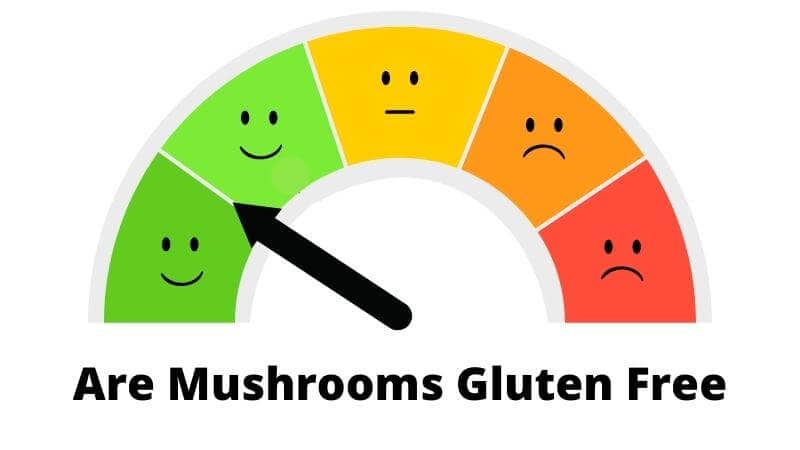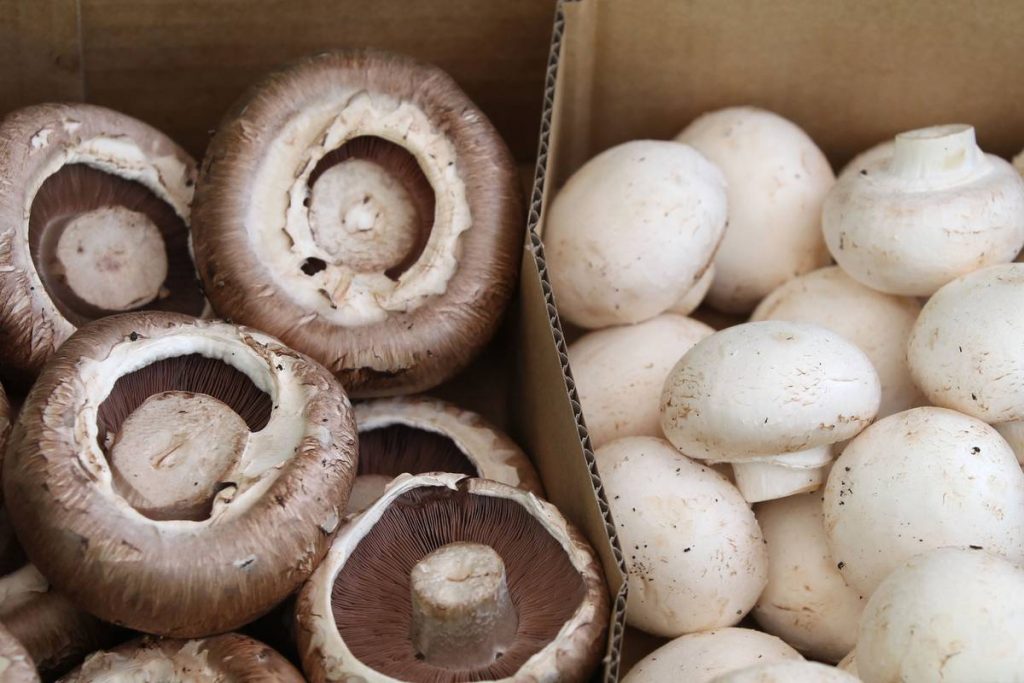Are mushrooms gluten free? Mostly yes. As mushrooms are a vegetable, and we know vegetables are gluten free, mushrooms specifically are a unique item that needs more consideration, mostly because of the way the are grown as mostly grains are used as the base for the mushrooms to grow on.
Keep reading to learn all about it and more.
Gluten Free Confidence Score of Mushrooms

Mushrooms get a confidence score of 8/10 mainly because of the growing phase – but that’s not to worry about too much for most people.
What Are Mushrooms

You’d think that mushrooms are nothing but fresh vegetables. After all, they aren’t grains, and gluten comes from grains, right? But, mushrooms farmed for consumption are often grown on straw.
It’s the easiest way to get started in this business. Even though mushrooms, as a fungus, are naturally free from gluten, their growth on the straws of grains can change the definition for some people.
So, even though there shouldn’t be a question about plain mushrooms being inherently gluten free, it’s the farming or growth technique that can be considered un-safe for some people with Celiac.
So can people with Celiac eat mushrooms or not
The traces of gluten in mushrooms is usually extremely small. Many people who are allergic to gluten enjoy this healthy and delicious veggie without any problem at all.
But it is difficult to say with surety how your body will react to the possible trace gluten in mushrooms. You can try to consume small amounts of mushrooms to see how it works for you.
To know if the mushrooms you’re about to buy have gluten or not, the best thing to do is to find out about their growth procedure.
Some mushrooms grow directly on the straw, while others may grow on wood. So, ask questions at the farmers’ market or the online store to know more. Also, make sure that you buy nothing but the freshest mushrooms for minimum gluten content.
Problematic Farming Of Mushrooms
Whether the mushroom will have gluten content or not will depend on the farm and the farming process. So, to find out more about this, it’s a good idea to buy your mushrooms from the farmers’ market so that you can find out more about their growth process.
Gluten gets introduced into the mushrooms based on the ingredients used in farming. As we mentioned before, straws of wheat or rye plants, as well as wheat bran, can be the key reason behind mushrooms becoming glutinous, when they are allowed to grow on the straws of such gluten grains.
A few farms use the leftover pulp from making beer. This is called Brewer’s Grain. This is yet another reason why mushrooms can end up with traces of gluten.
One of these, or their combination, maybe in the farming process, along with other items like soy meal, corn cobs, gypsum, etc.
These may be added to the soil that is then composted for the mushrooms to grow. That apart, hardwood sawdust and millets may also be used. Then there are some mushrooms that cannot be farmed on the straw at all.
So, the concern here is that mushrooms can grow on the gluten-containing substrate. During their growth, some mushrooms do not really touch the gluten-bearing part of the substrate.
In fact, according to farmers, the part of mushrooms we eat may not grow directly on the substrate.
In the case of certain mushrooms like crimini, white button, or portobello, they grow on a thick peat moss layer with limestone, which is applied on the top layer of the substrate to reserve water for the mushrooms. These mushrooms do not come in touch with the gluten layer at all.
Some mushrooms, like the shiitake, grow on wooden blocks only. Then there are the wild mushrooms that grow on decaying matter through a natural process. So, in both of these cases, there’s no chance of the fungi developing gluten content on them.
Some mushrooms are farmed in bags. In this process, the spores are put in a bag containing the substrate. This bag has holes in it, and the mushrooms start to grow out of these holes. That also means that they grow directly on the soil.
All these details play their roles in making mushrooms come in contact with gluten or not. So, it’s essential for you to find out about the farming conditions of the mushrooms.
Unlike store-bought items that come with a label, fresh mushrooms content can only be speculated based on freshness and farming conditions.
Will Washing Get Rid of the Gluten?
Mushrooms may contain gluten because of growing on gluten-bearing substrate, or because of cross-contamination, i.e., being handled in an environment that has gluten.
If it’s cross-contamination, then the gluten content can be washed off the mushrooms.
However, if the mushrooms are farmed on glutinous soil or gluten grain straw, the gluten content will be infused in the mushrooms.
So, you cannot be wash away this sticky protein from these fungi. If you’re super-sensitive to gluten, washing will definitely not help you.
Conclusion
Mushrooms are rich in vitamins, minerals, and antioxidants, as well as proteins and good carbs. They help break down carbs, proteins, and fats. It’s a staple for non-meateaters on a diet.
Don’t forget that there’s a wide variety of mushrooms with different flavors and textures. Plus, even when mushrooms are farmed on gluten-bearing soil directly, the traces of gluten in them are usually too low to affect someone whose gluten allergy is low-level. It only affects those who are super-sensitive to gluten.
So, it’s a good idea to find out the growth process and farming conditions of the mushrooms before buying them.